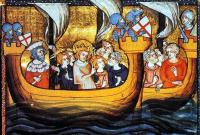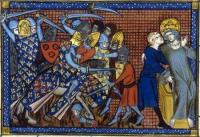The Seventh Crusade
Nicholas Zharkikh
In the mid-13th century affairs of the Crusaders in Palestine were very bad. Muslims surrounded their possession from all sides and got one victory after another. The most successful of these Muslim were Egyptian Mamluks.
In 1244 khorezmian army captured Jerusalem – the main goal of all efforts of the Crusaders. Later the course of events showed that this loss was irrevocable for the Crusaders.
In what way khorezmians skidded to Palestine? Since 1221 the army of Khorezm Sultan Jalal al-Din Mankburna was fighting against the Mongols. It waged with mixed success on spaces of modern Uzbekistan, Tajikistan, Turkmenistan, Afghanistan, Pakistan, Iran, Azerbaijan and Armenia. After the death of Jalal ad-Din (1231, Azerbaijan) khorezmians dislodged from their homeland established political contacts with the rulers of Egypt, and to offer the latest attack on Jerusalem.
Thus, the fall of Jerusalem was like a tsunami after the great political upheavals in Central Asia caused by the Mongols. The emergence of new military and political power has changed plans for the traditional players in the Middle East theater of political struggle, they all started looking for contacts with the Mongols and tried to bring them into an alliance against other fighters.
In Catholic Europe the fall of Jerusalem is made almost no impression. Pope and Christian kings encouraged each other to resist the enemies of the cross, but the affair was not moving further then exchange of views. One only French King Louis 9th (1214 – 1270) decided to involve in this struggle – and in 1245 he announced a new crusade (by common numbering – the seventh). He was blessed by pope Innocent the 4th to do this, which, however, made no impression on other monarchs. No other King offered a support to Louis, and this campaign became a French national enterprise, a kind of "small patriotic war". It showed the absence of unity and cohesion inside the Catholic superethnos against Islam, but rather demonstrated the opposite – fragmentation of Catholics.
So in 1248 King Louis mobilized a great army. It had more than 15 thousand people, including 3000 horse and 5000 infantry knights – arbalest shooters [These numbers give Russian and English Wikipedia. about 40 thousand cavalry and 20 thousand infantry – an obvious overstatement].
August 25, 1248 King with his army sailed from port Aigues-Mortes. Among the entourage of King was Guillaume de Rubruk…
Biographical information about Rubruk is very limited. Various reference books give quite different information about him. Thus, the chronological framework of his life portrayed in follow versions:
1, born in 1215..1220's, Cassel – died approx. 1270 (N. P. Shastina, 1957; German, Ukrainian Wikipedia);
2, 1215, Rubruk – 1295 (French and Bulgarian Wikipedia);
3, born approx. 1220, Rubruk – died approx. 1293 (English, Polish, Russian Wikipedia). Bulgarian Wikipedia supports this version only in the year of birth;
4, born approx. 1210 – died approx. 1270 (Daniel C. Waugh, 2002).
All these points of view portrayed simultaneously and independently, none of the authors does not provide a justification – from what indirect source data derived these dates, as well as not paying attention to other versions and is not depressed or refutation of their agreement.
All that can be derived from this lack of uniformity of opinions – is that the date and place of birth and death are unknown. His name "de Rubruk" means actually "from the Rubruk". Rubruk – a small village in the historic Flanders, in the extreme northeast of modern France near to its border with Belgium. "Source" for ideas about the birth of our hero here, I think, was his last name. Cassel – just over the town, about 10 km southeast of Rubruk, as well in France near to the border with Belgium.
As to the place of his death and burial there is no hypothesis, the time and circumstances of his death are unknown.
Also unknown is the beginning of his career: education, adoption of monasticism, the transition into the service of the French king and gaining the confidence of the latter.
The Rubruk's education was relatively high, as one can suggests a place from the 47th chapter of his book:
Some among them [the Mongolian diviners] know something of astronomy, particularly the chief, and they predict to them the eclipses of the sun and moon.
Whoever wrote this certificate, he had to have considerable knowledge of astronomy.
In addition, Rubruk had considerable knowledge of medicine. Although he did not engage in medical practice, he was interested by what means treating others thought about the properties of rhubarb and so assess Chinese doctors:
[Chinese] doctors know full well the virtues of herbs, and diagnose very skillfully the pulse; but they do not use diuretics, nor do they know anything about the urine (Ch. 28).
To give such an assessment Rubruk had to know what the pulse and urine.
…November 17, 1248 (other sources – in September 1248 – probably error) crusaders tributary fleet to Cyprus, where it made a long stop. Here, army held the whole winter, until the king had collected information about the political situation and developed a plan for further campaigns. Roman Empire (centered in Constantinople) invited him to fight against the Greek Nicaea Empire, Prince of Antioch and the Knights Templars – proposed war against the Muslims in Syria.
We have to read that Louis would conquer Egypt to have a food base for further offensive to reconquer Palestine and Jerusalem. I do not think that such a plan could seriously be considered. For the occupation of Egypt and establishing control over it to such an extent to get supplies from there and bring most of the troops to further war, crusaders forces would not have enough, and the French should to understand this. In my opinion, the strategic plan of campaign was repeat the sixth Crusade's plan (1228 – 1229 years), during which the Emperor Frederick the 2nd one just by demonstration of his power, without real battles, forced the Egyptian Sultan to cede Jerusalem.
So I think that Louis was going to land in Egypt to raise a threat to its capital – Cairo, forcing the enemy to a general battle (which, of course, seemed victorious for the Crusaders) and impose a peace that would include territorial concessions in Palestine. This plan can be evaluated as fully rational. After all the success in the siege of peripheral fortresses and in occupation of peripheral areas without defeating the enemy field army would be ephemeral.
…Frederick – the author of this strategy – at that time lived in Palermo, waving to the French navy with the cap and said, "Come on, come on!" And with curiosity he watched as how the plagiarist will fulfilled his tasks (well, this is a scene of unwritten historical novel…)
June 6, 1249 Crusaders captured Damietta, whose garrison simply fled before the attack. They had to pass (or float up the Nile) to Cairo 240 kilometers, or ten daily transitions.
And those happened unexpected. The first victory, instead strengthen the morale of troops, demoralized them. The soldiers became lazy and drunken. They don't want to leave Damietta and go further. But time worked against them and every day of delay the effect surprise factor weakened, and the Egyptians got the time to mobilize. We have to read that this strange behavior was caused by Nile overflow, which the Crusaders could not overcome. It is easy to understand that troops which have successfully floated 3,000 km from France to Cyprus and then another 400 km of Cyprus to the Nile Delta, the overflow of Nile hose in 1 or 2 km wide was indeed an insurmountable obstacle.
November 20, 1249 they went further and for 4 weeks without encountering any resistance, triumphantly passed the 90 km. When the French came to the channel Ashmum (now it is called Es-Sahir), on its south bank focused Egyptian army under the command of mamluk generals Faris ad-Din Aktai and Baibars al-Bundukdari (1223 – 1277). End of December 1249 and January 1250 were unsuccessful in attempts to force channel. Finally February 8th, 1250 French conveyed part of their forces through the channel. Vanguard under the command of the king's brother, Earl Robert d'Artua, fascinated by the first success and began pursuit. Probably suggest that Robert wanted to get all the glory of winning. Baybars ordered to open the gates of the Al-Mansura fortress and armor cavalry burst on its streets. The Egyptians counterattacked and destroyed this squad and its reckless commander was killed. This was the first victorious battle of Baibars, glorious commander and future sultan of Egypt.
Now for the continuation of the attack was not what to think, but instead the retreat king ordered to defend the camp and offered the new Sultan Turanshah to exchange Damietta for Jerusalem and some areas in Syria. Sultan, of course, refused. Night on April 5, 1250 the Crusaders started to retreat to Damietta. Oh, here they were much faster and one day reached the village Farskur (60 km from El Mansoura and 30 km from Damietta). Egyptian army pursued them steadily and April 6, 1250 made a strong attack, boldly destroyed the French camp and captured the King, his brothers – Charles de Anjou and Alphonse de Poitiers, and many knights. Crusaders army ceased to exist.
King undertook to pay a huge ransom (800 thousand gold dinars), pass Damietta to Egyptians and not return to Egypt. The last condition mentioned in the mockingly song, composed by Jamal al-Din Ibn Matruh: "If the king to try to fight, let him know that his prison is fully ready and bonds, in which he was shackled, not too rusty".
So Louis at May 8, 1250 sailed from Egypt to Acre in Palestine, where stayed until 1254, hoping for arrival of new crusaders.
…A Frederick in his Palermo, having received news from the front, perhaps, said: "Not to the conformable professor approached. That the Germans well – is for Frenchman death" (even a scene from the same novel…) Frederick died December 13, 1250, and certainly managed to get full information about the collapse of the French campaign. Finally, we have seen that those who Papal Certification Commission excluded from the ranks of the Catholic Church for bad behavior and failure of administration orders, grasped some success, but one who is not one iota departed from the papal dictates – suffered the biggest defeat, which can only imagine.


